The product recommendations in this post are recommendations by the writer and/or expert(s) interviewed and do not contain affiliate links. Meaning: If you use these links to buy something, we will not earn a commission.
Frozen dinners have come a long way since the microwave TV dinners of the 1950s. Not only have the flavor options and accessibility of these dinners changed, but there are more healthy frozen meals available today. At the same time, there are also plenty of unhealthy frozen dinners that are marketed as “healthy,” despite actually being loaded with sodium, added sugar, fat, and weird preservatives.
When you’re wandering down the frozen food section of the grocery store in search of a convenient nutritious meal, it can be difficult to differentiate between healthy and unhealthy frozen dinners, especially when you’re in a hurry. With that in mind, we spoke to a few dietitians about what you may want to avoid when in pursuit of a fast, easy, healthy frozen meal, so that you to spot an unhealthy frozen dinner disguised as otherwise when it crosses your path.
Here are six frozen meals dietitians say are marketed as “healthy,” but are actually terrible for you. And for more tips on how to find a convenient, healthy meal on a busy weeknight, be sure to also read When It Comes to Frozen Foods, These Are the Healthiest.
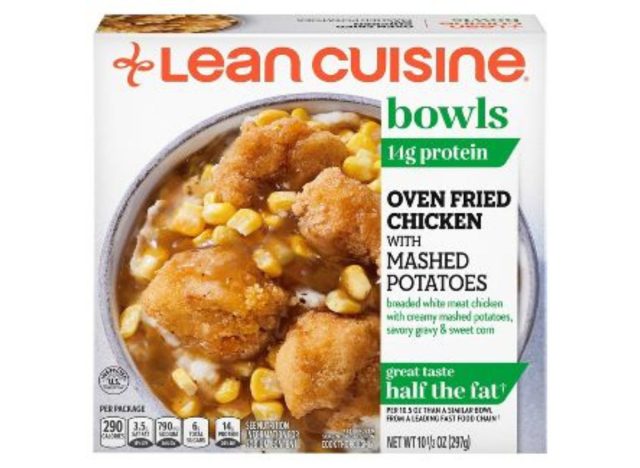

Per meal: 290 calories, 9 g fat (3.5 g saturated fat), 790 mg sodium, 38 g carbs (2 g fiber, 6 g sugar), 14 g protein
“Although this meal is low in calories, it’s lacking protein and fiber to help to keep you feeling full,” say Tammy Lakatos Shames, RDN, CDN, CFT, and Lyssie Lakatos, RDN, CDN, CFT, also known as the Nutrition Twins. “With only 14 grams of protein and two of the 25–30 grams of fiber you need each day, it’s likely you’ll be hungry soon after and looking for a snack—or another meal.”
“Despite being low in calories, it’s salty with 30% of the recommended maximum daily sodium limit, highly processed with bleached flours and starches, and high in saturated fat with 21% of your daily maximum allotment,” the Nutrition Twins add.
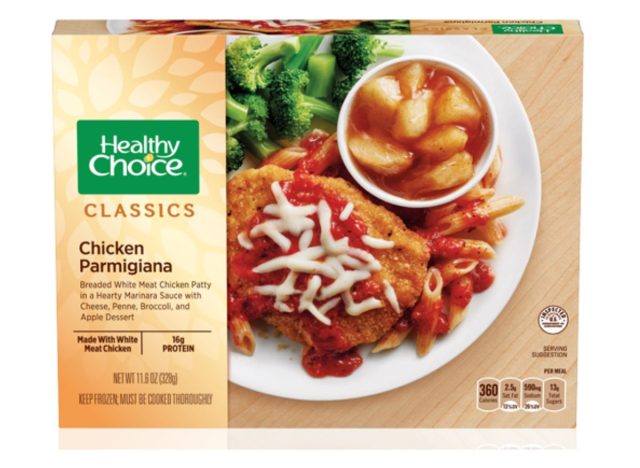

Per meal: 320 calories, 9 g fat (2 g saturated fat), 500 mg sodium, 44 g carbs (5 g fiber, 11 g sugar), 16 g protein
Another “healthy” choice that isn’t all that healthy is the Chicken Parmigiana meal from Healthy Choice.
“This one has 8 grams of added sugar—women should have a maximum of 24 grams and men shouldn’t go above 36 grams. Given that this isn’t dessert, an innocent eater likely wouldn’t think to even consider sugar,” the Nutrition Twins explain. “With 500 milligrams of sodium—which is around 25% of the daily maximum recommended amount—and a lengthy ingredient list that includes many additives and preservatives, this meal is better off left in the frozen aisle freezer.”
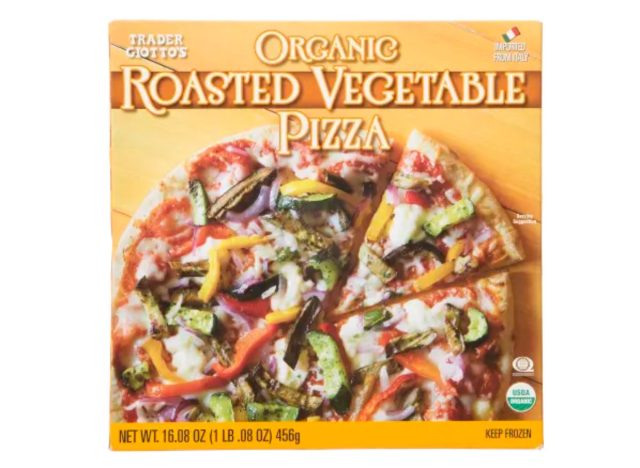

Per meal: 300 calories, 11 g fat (4.5 g saturated fat), 550 mg sodium, 36 g carbs (4 g fiber, 5 g sugar), 12 g protein
“You’d assume an organic meal that included a rainbow of colorful veggies would be healthy,” says the Nutrition Twins. “But the downside of this one is that a serving is only one-third of the pizza. Not only do many people eat more than this, but even if you stick to the serving size, you’ll still get hit with 4.5 grams of saturated fat—26% of your daily maximum allotment.”
It’s also crucial to pay attention the amount of protein a meal has, because is what will help keep you full longer and help to satiate your appetite.
READ RELATED: Antioxidant Supplement Linked to Deathly Heart Disease & Stroke, New Study Finds
“Given that it’s tough to stay satisfied with only 12 grams of protein in each serving, it’s no wonder most people easily eat two servings per sitting,” says the Twins.
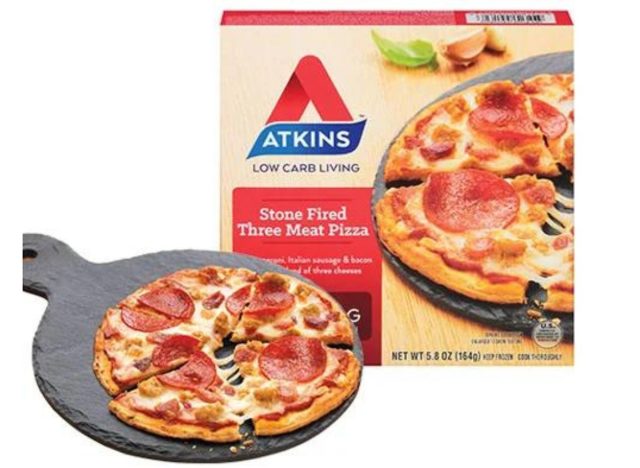

Per meal: 420 calories, 29 g fat (11 g saturated fat), 1,150 mg sodium, 27 g carbs (16 g fiber, 2 g sugar), 26 g protein
“Atkins meals are known to be keto-friendly and this meal provides a nice dose of protein and fiber, thanks in part to the oat fiber pizza crust,” says the Twins. “But it comes with a hefty price tag related to heart health.”
Consuming too much sodium and saturated fat over time has been linked to higher LDL cholesterol levels, high blood pressure, and greater risk for heart disease.
“One serving has 1,150 milligrams of sodium and 11 grams of saturated fat, which are both nearly half of your daily maximum allotment,” the Twins explain.
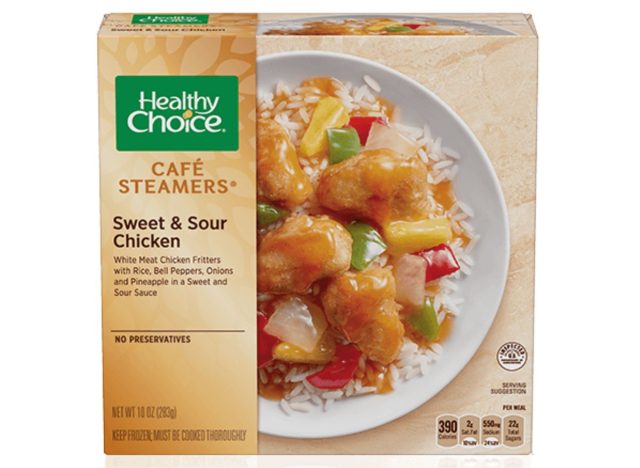

Per meal: 390 calories, 9 g fat (2 g saturated fat), 550 mg sodium, 63 g carbs (3 g fiber, 22 g sugar), 12 g protein
“While Healthy Choice meals are portion controlled and relatively low in calories compared to something like Hungry-Man and Banquet Mega Bowls, some of their frozen meals are not truly the ‘healthy choice,'” says Lisa Young, Ph.D., RDN, author of Finally Full, Finally Slim and member of our Medical Expert Advisory Board. “The Sweet and Sour Chicken, for example, contains over 20 grams of sugar and 600 milligrams sodium.”
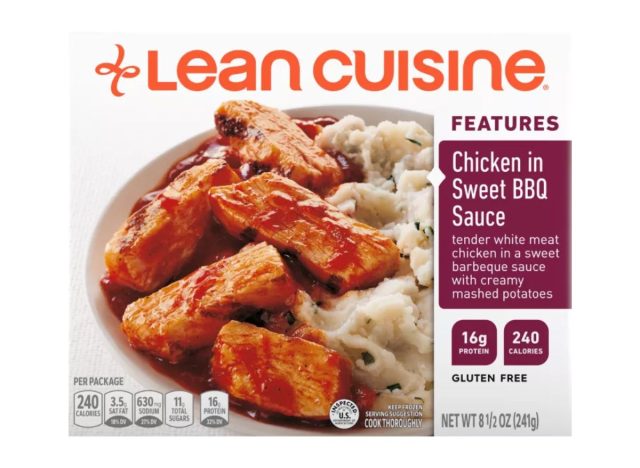

Per meal: 240 calories, 7 g fat (3.5 g saturated fat), 630 mg sodium, 29 g carbs (2 g fiber, 11 g sugar), 16 g protein
Lean Cuisine markets themselves as a healthy or “lean” frozen dinner choice beyond just its brand name; it also places the lower calorie count right on the front of their packaging. However, Young warns that these meals may not be the best.
“These meals are calorie controlled due to their small portion sizes, but they are not very filling and tend to be low in vegetables and whole grains, and high in salt and sugar,” says Young. “This dish, for example, contains over 600 milligrams of sodium and 14 grams of sugar. I suggest you cook something simple at home instead.”
With all of the other healthy frozen dinners out there, it may be a good idea to skip over the six listed above, and opt for cleaner, more protein-dense options that also contain less sodium and added sugars.
Source:








